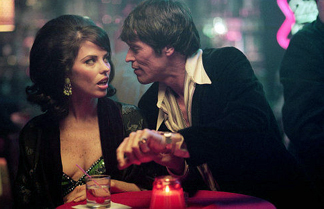Auto Focus
Hogan's Hormones
By Patrick Reed

"Nice cleavage, or lack thereof."
Auto Focus has the sort of sordid subject matter that has become ever-so-common in our contemporary tabloid culture, guaranteed to repel a certain segment of the moviegoing audience just as sure as it's bound to fascinate and attract another. Based on the out-of-print book The Murder of Bob Crane, Auto Focus investigates the dissolution of a popular 60s TV sitcom star due to a spiraling sex-and-video addiction, a perverse tale that has long enthralled a subculture of pop-culture devotees who get off on the whole "sin-underneath-the-Hollywood-sunshine" cliché. Taken at face value, Bob Crane, Hogan's Heroes, and the early days of amateur pornography don't amount to much, just scraps of cultural nostalgia that really weren't worth a damn to begin with. It follows, then, that the story of Bob Crane's demise must signify something larger, express some enduring points about the human condition-doesn't it?
Utilizing recent popular culture phenomena as topic matter for serious drama has to be risky: you're dealing with material that most of the audience remembers firsthand, and likely has never thought about in-depth, but if handled skillfully the results can be revelatory. Case in point: among the producers of Auto Focus are Scott Alexander and Larry Karaszewski, who penned screenplays for three fringe-celebrity biopics in the 90s: 1994's Ed Wood, 1996's The People vs. Larry Flynt, and 1999's Man on the Moon. Auto Focus' production credentials are similar to the above three films, although Alexander and Karaszewski refrain from scriptwriting this time (first-timer Michael Gerbosi brought his script to the duo's attention in yet another example of perseverance paying off). As before, the director (Paul Schrader) is noted for artistic integrity and has several enduring classics in his résumé to prove it, while the lead actor (Greg Kinnear) began his career in the very sort of low-rent television neighborhood that Bob Crane never broke out of, and is in the process of making the difficult career transition to film work. Given that the central subject and story of Auto Focus appear flimsy upon first (and second, and third) glance, the question arises: is there anything meaningful to glean from Bob Crane's tawdry life?
Auto Focus begins during the idyllic early 60s, where Bob Crane (Kinnear) is a happy-go-lucky embodiment of the American Dream: successful SoCal disc jockey, married to his high school sweetheart (Rita Wilson), cute kids, suburban home, church every Sunday, and several hobbies on the side (playing drums, amateur photography). Bob really aspires to be an actor, "the next Jack Lemmon," but the best his agent (Ron Leibman) can offer is a sitcom set in a WWII German POW camp. Against most expectations, Hogan's Heroes becomes a hit, and soon Bob meets up with an audio/video gearhead named John Carpenter (not the Bowling Green, KY director of Halloween and Escape From New York, and played by Willem Dafoe) and begins frequenting go-go clubs every night. Crane's predilection for snapping pics of nude women soon devolves into a never-ending double life: maintaining a squeaky-clean, Disney-ish career profile in showbiz while participating in countless orgies with Carpenter and nubile groupies, every one of them videotaped. Crane's first marriage crumbles, and his second, "open" one to a Hogan's co-star (Maria Bello) quickly becomes a ridiculous arrangement. Eventually, Hogan's is canceled, Crane descends to dinner theater and Gus as the industry gets wind of his addiction, and all the while he and Carpenter continue living their mantra, well into the disco era: "A day without sex is a day wasted."
Auto Focus ends with Crane's unsolved 1978 murder in Scottsdale, Arizona, and Kinnear's voice-over from the afterlife (à la Sunset Boulevard) offers no clear reasoning behind his disintegration; there are brief hints before his death that Crane wanted to get help and ditch Carpenter, but overall the man's narcissism won out. Ever since his breakthrough script for Taxi Driver, Paul Schrader has explored the moral dimensions of American society, searching for virtue in a land overflowing with vice, and Auto Focus is perhaps his most discouraging commentary yet on America's obsession with self-gratification. The sex is mechanical and joyless, the relentless celebrity ass-kissing distasteful, and Kinnear's portrayal of Crane remains on the shallow surface (probably on purpose, although there is one disturbing daydream sequence involving the cast of Hogan's in an orgy that gives a brief indication of Crane's tortured soul). The better performance is Dafoe's; rarely has a more thorough portrait of a hapless sycophant been created than his John Carpenter, always doing the legwork for Crane, setting up chicks to score with and equipment to record the dirty deeds, and always settling for whatever Bob decrees. Overall, Auto Focus may not offer any new insight into human behavior-anything done to excess can be destructive, no doubt-but this study of a selfish and rather pathetic man is a sobering reminder of just how warped our culture based on instant pleasure and status worship has become.
HOME | THIS ISSUE | ACE ARCHIVES